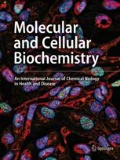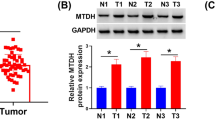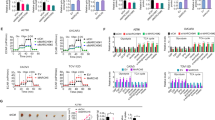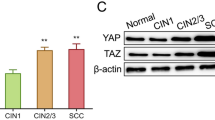Abstract
Sirtuin 3 (SIRT3) modulates mitochondria-localized processes and is implicated in the metabolic reprogramming of cancer cells, especially fatty acid (FA) synthesis. However, the relationship between SIRT3 and aberrant lipid synthesis in cervical cancer remains unclear. Here, we investigated the clinical relevance of SIRT3 expression in cervical squamous cell carcinoma (CSCC), cervical intraepithelial neoplasia (CIN), and normal tissues. To analyze the role of SIRT3 in CCSC in vitro, endogenous SIRT3 levels were up- and down-regulated in SiHa and C33a cells, respectively, via lentiviral-based transfection. Levels were quantified using qRT-PCR. Acetylation levels for acetyl-coA carboxylase (ACC1) were measured with the anti-acetyllysine antibody. Knockdown of SIRT3 reduced levels of cellular lipid content in cells. To investigate the role of SIRT3 in cell proliferation, nude mice were xenografted with SIRT3-overexpressing or SIRT3-knockdown CCSC cells. Overall, the results demonstrate that SIRT3 significantly contributed to the reprogramming of FA synthesis in CCSC by up-regulating ACC1 to promote de novo lipogenesis by SIRT3 deacetylation. Moreover, the findings show that the SIRT3-mediated regulation of FA synthesis played a critical role in the proliferation and metastasis of CCSC cells, suggesting that SIRT3 has therapeutic potential in CCSC treatment.





Similar content being viewed by others
Abbreviations
- CCSC:
-
Cervical squamous cell carcinoma
- CIN:
-
Cervical intraepithelial neoplasia
- SIRT3:
-
Sirtuin 3
- ACC1:
-
Acetyl-coA carboxylase 1
References
Torre LA, Bray F, Siegel RL, Ferlay J, Lortet-Tieulent J, Jemal A (2015) Global cancer statistics. CA Cancer J Clin 65:87–108
Li J, Kang LN, Qiao YL (2011) Review of the cervical cancer disease burden in mainland China. Asian Pac J Cancer Prev 12:1149–1153
Obrzut B, Semczuk A, Narnog M, Obrzut M, Król P (2017) Prognostic parameters for patients with cervical cancer FIGO stages IA2-IIB: along-term follow-up. Oncology 93:106–114
Pascual G, Avgustinova A, Mejetta S, Martín M, Castellanos A, Attolini CS, Berenguer A, Prats N, Toll A, Hueto JA, Bescós C, Di Croce L, Benitah SA (2017) Targeting metastasis initiating cells through the fatty acid receptor CD36. Nature 541:41–45
Currie E, Schulze A, Zechner R, Walther TC, Farese RV Jr (2013) Cellular fatty acid metabolism and cancer. Cell Metab 18:153–161
Warburg O (1956) On the origin of cancer cells. Science 123:309–314
Christofk HR, Vander Heiden MG, Harris MH, Ramanathan A, Gerszten RE, Wei R, Fleming MD, Schreiber SL, Cantley LC (2008) The M2 splice isoform and pyruvate kinase is important for cancer metabolism and tumour growth. Nature 452:230–234
Sant’Anna-Silva ACB, Santos GC, Campos SPC, Oliveira Gomes AM, Pérez-Valencia JA, Rumjanek FD (2018) Metabolic profile of oral squamous carcinoma cell lines relies on a higher demand of lipid metabolism in metastatic cells. Front Oncol 8:13
Corbet C, Feron O (2017) Emerging roles of lipid metabolism in cancer progression. Curr Opin Clin Nutr Metab Care 20(4):254–260
Nath A, Chan C (2016) Genetic alterations in fatty acid transport and metabolism genes are associated with metastatic progression and poor prognosis of human cancers. Sci Rep 6:18669
Kolusheva S, Wachtel E, Jelinek R (2003) Biomimetic lipid/polymer colorimetric membranes: molecular and cooperative properties. J Lipid Res 44(1):65–71
Kuhajda FP (2000) Fatty-acid synthase and human cancer: new perspectives on its role in tumor biology. Nutrition 16:202–208
Menendez JA, Lupu R (2007) Fatty acid synthase and the lipogenic phenotype in cancer pathogenesis. Nat Rev Cancer 7:763–777
Setoyama D, Fujimura Y, Miura D (2013) Metabolomics reveals that carnitine palmitoyltransferase-1 is a novel target for oxidative inactivation in human cells. Genes Cells 18:1107–1119
Hasim A, Ali M, Mamtimin B, Ma JQ, Li QZ, Abudula A (2012) Metabonomic signature analysis of cervical carcinoma and precancerous lesions in women by (1)H NMR spectroscopy. Exp Ther Med 3(6):945–951
Ye N, Liu C, Shi P (2015) Metabolomics analysis of cervical cancer, cervical intraepithelial neoplasia and chronic cervicitis by 1H NMR spectroscopy. Eur J Gynaecol Oncol 36(2):174–180
Hasim A, Nuermangu R, Lixiu X (2018) Analyze the metabolic changes and metabolic pathways in tumor tissues of cervical squamous cell carcinoma. J Xinjiang Med Univ 5(41):521–526
Hebert AS, Dittenhafer-Reed KE, Yu W, Bailey DJ, Selen ES, Boersma MD, Carson JJ, Tonelli M, Balloon AJ, Higbee AJ, Westphall MS, Pagliarini DJ, Prolla TA, Assadi-Porter F, Roy S, Denu JM, Coon JJ (2013) Calorie restriction and SIRT3 trigger global reprogramming of the mitochondrial protein acetylome. Mol Cell 49(1):186–199
Hong QL, Feng Z, Wu W, Li J, Zhang J, Xia T (2013) SIRT3 regulates cell proliferation and apoptosis related to energy metabolism in non-small cell lung cancer cells through deacetylation of NMNAT2. Int J Oncol 43:1420–1430
Qiao Y, Xu L, Tao X, Yin L, Qi Y, Xu Y, Han X, Tang Z, Ma X, Liu K, Peng J (2018) Protective effects of dioscin against fructose-induced renal damage via adjusting Sirt3-mediated oxidative stress, fibrosis, lipid metabolism and inflammation. Toxicol Lett 1(284):37–45
Wei Z, Song J, Wang G, Cui X, Zheng J, Tang Y, Chen X, Li J, Cui L, Liu CY, Yu W (2019) Deacetylation of serine hydroxymethyl-transferase 2 by SIRT3 promotes colorectal carcinogenesis. Nat Commun 10:774
Zou X, Zhu Y, Park SH, Liu G, O’Brien J, Jiang H, Gius D (2017) SIRT3-mediated dimerization of IDH2 directs cancer cell metabolism and tumor growth. Cancer Res 77:3990–3999
Yan SM, Han X, Han PJ, Chen HM, Huang LY, Li Y (2014) SIRT3 is a novel prognostic biomarker for esophageal squamous cell carcinoma. Med Oncol 31(8):103
Ma JQ, Tuersun H, Jiao SJ, Zheng JH, Xiao JB, Hasim A (2015) Functional role of NRF2 in cervical carcinogenesis. PLoS ONE 10(8):e0133876
Schwer B, North BJ, Frye RA, Ott M, Verdin E (2002) The human silent information regulator (Sir) 2 homologue hSIRT3 is a mitochondrial nicotinamide adenine dinucleotide-dependent deacetylase. J Cell Biol 158:647–657
Sol EM, Wagner SA, Weinert BT, Kumar A, Kim HS, Deng CX, Choudhary C (2012) Proteomic investigations of lysine acetylation identify diverse substrates of mitochondrial deacetylase Sirt3. PLoS ONE 7(12):e50545
Yao C-H, Liu G-Y, Wang R, Moon SH, Gross RW, Patti GJ (2018) Identifying off-target Effects of etomoxir reveals that carnitine palmitoyl transferase I is essential for cancer cell proliferation in dependent of β-oxidation. PLoS Biol 16(3):e2003782
Baenke F, Peck B, Miess H, Schulze A (2013) Hooked on fat: the role of lipid synthesis in cancer metabolism and tumour development. Dis Model Mech 6:1353–1363
Hirschey MD, Shimazu T, Goetzman E, Jing E, Schwer B, Lombard DB, Grueter CA, Harris C, Biddinger S, Ilkayeva OR, Stevens RD, Li Y, Saha AK, Ruderman NB, Bain JR, Newgard CB, Farese RV Jr, Alt FW, Kahn CR, Verdin E (2010) SIRT3 regulates mitochondrial fatty-acid oxidation by reversible enzyme deacetylation. Nature 464(7285):121–125
Ansari A, Rahman MS, Saha SK, Saikot FK, Deep A, Kim KH (2017) Function of the SIRT3 mitochondrial deacetylase in cellular physiology, cancer, and neurodegenerative disease. Aging Cell 16(1):4–16
Wang C, Rajput S, Watabe K, Liao DF, Cao D (2010) Acetyl-CoA carboxylase-a as a novel target for cancer therapy. Front Biosci 2:515–526
Abramson HN (2011) The lipogenesis pathway as a cancer target. J Med Chem 54:5615–5638
Balaban S, Lee LS, Varney B, Aishah A, Gao Q, Shearer RF, Saunders DN, Grewal T, Hoy AJ (2018) Heterogeneity of fatty acid metabolism in breast cancer cells underlies differential sensitivity to palmitate-induced apoptosis. Mol Oncol 12(9):1623–1638
Gugiatti E, Tenca C, Ravera S, Fabbi M, Ghiotto F, Mazzarello AN, Bagnara D, Reverberi D, Zarcone D, Cutrona G, Ibatici A, Ciccone E, Darzynkiewicz Z, Fais F, Bruno S (2018) A reversible carnitine palmitoyltransferase (CPT1) inhibitor offsets the proliferation of chronic lymphocytic leukemia cells. Haematologica 103(11):e531–e536
Acknowledgements
This work was supported by the State Key Laboratory of Pathogenesis, Prevention, Treatment of High Incidence Diseases in Central Asia Fund (SKL-HIDCA-2017-3), Xinjiang Uygur Autonomous Region University Research Innovation Team Fund (Proj.No.XJEDU2017T006), and Program for Innovative Research Teams (99-11091107202).
Author information
Authors and Affiliations
Contributions
LXX and A. H. performed most experiments, analyzed the data, wrote the manuscript; LXX, LJH, and JQL participated in the in vivo study; LXX and JQM analyzed the data and revised the manuscript; and A. H. designed the overall study, supervised the experiments, and analyzed the results.
Corresponding author
Ethics declarations
Conflict of interest
The authors who have taken part in this study declared that they do not have anything to disclose regarding funding or conflict of interest with respect to this manuscript.
Additional information
Publisher's Note
Springer Nature remains neutral with regard to jurisdictional claims in published maps and institutional affiliations.
Rights and permissions
About this article
Cite this article
Xu, L.X., Hao, L.J., Ma, J.Q. et al. SIRT3 promotes the invasion and metastasis of cervical cancer cells by regulating fatty acid synthase. Mol Cell Biochem 464, 11–20 (2020). https://doi.org/10.1007/s11010-019-03644-2
Received:
Accepted:
Published:
Issue Date:
DOI: https://doi.org/10.1007/s11010-019-03644-2




